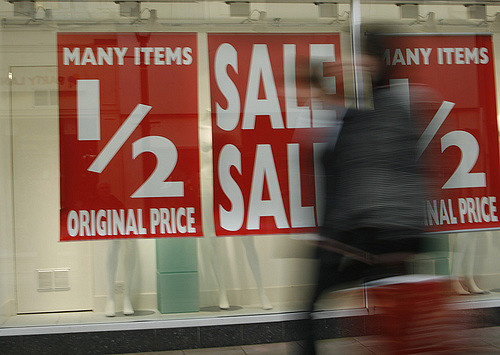In a recent newscast, NPR carried a story on the so-called “Nutella Riots” in France, in which shoppers literally fought over discounted jars of chocolate-hazelnut spread. It seemed like a strange event, but everything else about the report felt pretty normal. That’s when NPR dropped this bombshell on my afternoon:
“In France, selling at a loss is illegal, except under very specific conditions.”
Sorry, what?
I figured I must have misheard. Granted, France is a long ways from Bastiat at this point, but surely they still have some standards. Right?
Wrong.
On subsequent playbacks, NPR reporter Eleanor Beardsley confirmed the absurd–and, impressively, she did so without any hint of shock in her voice.
It turns out this really is a law in France. According to The Guardian, French companies are generally prohibited from selling products at a loss, except during two officially prescribed six-week sales periods where discounts are permitted. But even during the official sales periods, companies are limited to selling products that are more than 30 days old and the price they charge must still be deemed “fair” by the authorities.
Economic Effects
There are several likely effects from this rule.
For retailers, it means higher average inventory costs and less flexibility. Whenever they purchase more of a product than they can profitably sell, they will face two bad choices.
They can wait for the next sales window to open so they can sell at a steep discount and recover at least some of the cost. However, with this option, they would incur storage costs while waiting for the official sales period to start.
Alternatively, they can simply dispose of the product to free up room in their inventory sooner. This saves on storage costs but also ensures they will lose all of their initial purchase price.
Notably, both of these options are generally worse than the option that would be available in a normal market–the ability to hold a discount sale immediately, regardless of what month it happens to be.
France’s restrictions artificially raise the cost of buying too much product for resale or trying to sell a new product that doesn’t work out. In turn, this will make companies more reluctant to stock new products that are unproven. They are incentivized to focus more on stocking mainstream items that they know they can sell. This means consumers will have fewer choices and entrepreneurs will find it harder to get traction with a new offering.
But even if companies try to adapt to the policy, they will still invariably make some mistakes in their purchasing decisions. Since those mistakes are more expensive under France’s restriction regime, chances are they will pass some of these costs along to their customers in the form of higher prices.
To recap then, France’s discount restriction entails more regulation, more costs, and less flexibility for French retailers. Meanwhile, it also offers higher costs and fewer choices for French consumers.
Given these problems, you might be wondering why such a policy exists at all. Were French voters (and consumers) really clamoring for fewer sales at some point?
I’m not sure about that. However, the official justification for the policy today is the same one that often gets used to explain other bad economic ideas–“fairness”.
Specifically, the French government alleges that selling products below cost amounts to “unfair competition”. Thus, the argument goes, the practice needs to be heavily regulated.
In reality, France’s policy is a solution in search of a problem.
Market Solutions to “Unfair Competition”
The market provides a natural check on the type of “unfair competition” discussed above. A company that is selling all its products at a loss cannot do so in perpetuity. At some point, it will have to turn a profit or perish. After all, it doesn’t matter how much market share you have if all your sales lose money.
Of course, it may be argued that large companies might be able to endure these types of losses long enough to force smaller firms to go bankrupt and acquire a monopoly. That could indeed occur, but it’s not the end of the story.
After the small firms go bankrupt, the large firm would need to raise prices to reap the benefit of having a monopoly. But once prices go back up, then new small firms could enter to compete again. For the large firm’s strategy to be successful, it would have to constantly be willing to drop prices to loss levels to fight off competitors. But then it never has a chance to reap the monopoly profits it seeks, and the strategy becomes self-defeating.
In the more nuanced case of a grocery store, we can imagine a company selling some high-profile products at a loss to attract more people to its store–in marketing jargon, such products are described as “loss leaders”. If the strategy is successful, and the store makes money on other products that customers buy, this really could be a sustainable long-term strategy.
Notice, however, that there’s nothing preventing competitors from adopting the same marketing tactic. They could experiment with their own loss leaders or different marketing strategies to try to lure customers back to their stores. There’s nothing remotely “unfair” about this type of competition. Businesses are supposed to compete for customers, and the customers benefit regardless of which company is more successful.
Who Decides What Is Fair?
Ultimately, it shouldn’t be up to competitors or the government to decide what qualifies as fair.
The fairness or unfairness of a given transaction should be judged by the people participating in the transaction. In this case, the grocery store decided to sell Nutella at a discount voluntarily. Many customers were eager (okay, perhaps too eager) to take them up on the offer. These are the only two stakeholders that matter for determining whether a sale was fair. And since both sides participated willingly, we can safely assume they both believed the transaction was in their interest–that it was indeed fair.
There is no reason for the government to step in and prevent this exchange from occurring. The right solution for the government is to do nothing.
Let companies decide when they want to have a sale. Let the market sort out “unfair competition”. And let individuals decide what is fair for themselves.
































